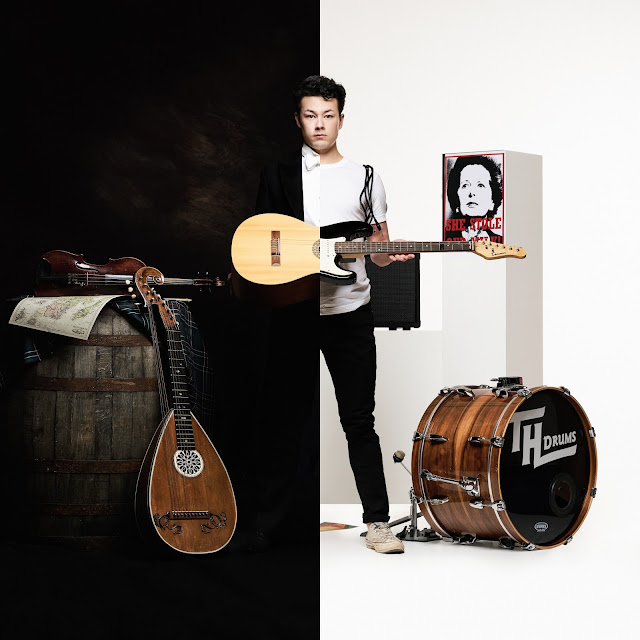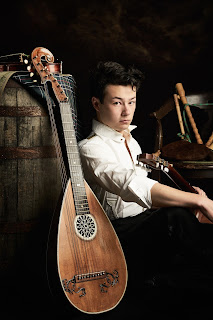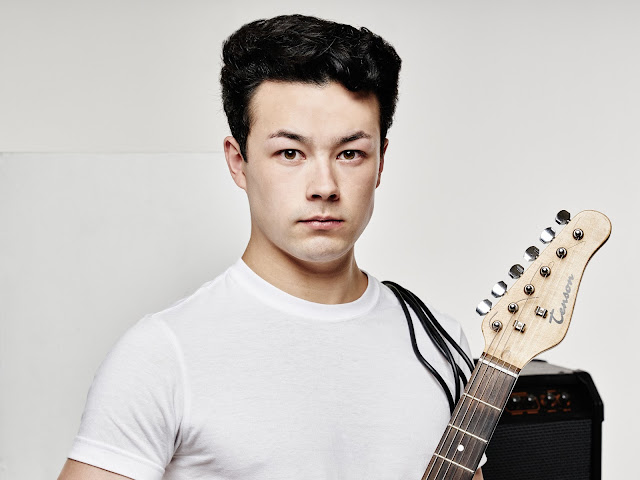 |
| Sean Shibe - softLOUD (photo Kaupo Kikkas) |
We can be sad about the modern-day lack of reverence for softly spoken things
 |
| Sean Shibe - (photo Kaupo Kikkas) |
Moving to electric guitar, Sean will be playing Steve Reich's Electric Counterpoint, LAD by Julia Wolfe (originally for nine bagpipes, and written after the funeral of a friend) and David Lang's Killer. He will be multi-tracking some of these pieces and when we spoke had just finished the recordings with the BBC (which will be broadcasting one of the recitals from the East Neuk Festival in late June). Sean explains that the loud part of the programme is more cathartic, as well as being elegiac and mournful, and one aspect of the programme is Sean's feeling that we can be sad about the modern-day lack of reverence for softly spoken things.
The urge to explore something more urgent and pointed
As a classical guitarist Sean will never abandon the classical recital, but he also has the urge to explore something more urgent and pointed; to try and reference the emotions that his generation (he is 25) is going through. This is particularly true of Sean as a Scot, with the referendum, Brexit and now the forthcoming election. So softLOUD is intended to represent something here and now, a millennial referencing his generations feelings at a time of disenfranchisement.
Sean has a Japanese mother and an English father, but was born and brought up in Scotland. His identity as a Scot is clearly very important to him as is the wider issue of politics. He says that he is not strictly a patriot, but he takes great pride in what his country has done, and he refers to the support from Creative Scotland and the more general Scottish commitment to the arts as something to be proud of (and open to criticism too). He adds that Conservative governments do not seem to be great for the arts.
He quotes Leonard Bernstein after the assassination of John Kennedy 'our response to violence is to play music more beautifully and more tenderly', yet Sean feels this is only the beginning and he wants to do more. He also thinks that students in conservatoires are not encouraged to be as outrageous as they can.
Students are not encouraged to be as outrageous as they can
Sean hopes that the softLOUD programme will attract a mixed audience, he feels that the early music, with its tender music and good writing for the instrument, will attract those attracted to more traditional programmes whilst those more adventurous will come partly because of the electric guitar. But he also feels there is a synergy in the programme and he hopes that it will push people in different directions.
Sean points out that there is a growing attendance at classical club-style events such as Nonclassical, and he sees these as becoming more popular with people coming out of curiosity, and the audience is quite distinctive and often a bit put off by the presentation of traditional concerts. Sean has friends who find the standard concert programme and format out of date.
He emphasises that his own commitment to giving recitals is strong and will continue, but he is also interested in creating events. He wants to create something which is pressing and dangerous, and not just a nice night out. He knows that softLOUD may shock some people, but he wants people to think about their Scots musical heritage, and points out that Peter Maxwell Davies was happy to be remembered for Farewell to Stromness
 |
| Sean Shibe - (photo Kaupo Kikkas) |
The fascination the electric guitar holds
for an instrumentalist whose instrument is fundamentally quiet
As a teenager, Sean played classical music whilst everyone else was playing electric guitar, and now many of his friends are moving from electric to acoustic whilst Sean has made the journey in the opposite direction. He points out the fascination the electric guitar holds for an instrumentalist whose instrument is fundamentally quiet and uses colour to imply strength and sustaining of notes. The electric guitar does not imply, it has all these qualities, Sean calls it awesome in the old fashioned sense (relating to awe). Yet, when he plays the electric guitar there are things he misses which the classical guitar can do, and vice versa.
Sean feels he has a healthy relationship with the instrument, and points out that the classical guitar and the electric guitar are fundamentally different instruments. Though the electric guitar is plucked, in many ways it is closest to bowed instruments and to a synthesizer, in many ways it is an arcane instrument. Sean adds that no wonder the instrument is very much a sex symbol as its sound is so virile. Whilst the classical guitar is a more charming, with a different kind of magic; very much the English gentleman to the electric guitar's Lord Byron in Venice.
Sean started playing the guitar at the age of seven, partly because there was a guitar club after school and his mother happened to walk past a shop selling guitars! It is very much a solitary instrument, and Sean likes it; his favourite time is his period in the morning with his guitar, with his phone off. He enjoys playing chamber music and during his period as a BBC New Generation Artist did quite a bit of guitar and voice, whilst he has been invited to two Marlboro Music Festivals and played a great deal of chamber music there.
softLOUD and beyond
We meet the morning after the RPS Awards, which Sean attended. He is playing at this Summer's East Neuk Festival (which won the Audiences and Engagement Award with 14-18:NOW); this festival and the Lammermuir Festival (which won the Concert Series and Festivals Award) were first two festival's Sean played at.
Sean is performing softLOUD at the East Neuk Festival on 29 and 30 June 2017, and then at the Edinburgh Festival Fringe from 21 to 26 August 2017. And he hopes to do more, adding that Creative Scotland is good at encouraging projects to go on the road.
He also has eight dates in China in July, playing Scots Baroque music, Bach's Lute Suite No. 4 and Villa Lobos, and Sean's debut recital disc comes out on Delphian Records in July, Dreams and Fancies: English music for solo guitar. This recital will start with Dowland fantasies, followed by Malcolm Arnold's only work for solo guitar, Walton's Bagatelles which were dedicated to Arnold, Lennox Berkely's Sonatina, and Benjamin Britten's Nocturnal after John Dowland which brings the recital full circle. It is a striking and well thought-out programme, and he adds wryly that it is nice to have a first CD which which avoids the twenty or so Spanish miniatures 'which we know and love (and despise)'.
Sean's classical guitar is Bert Kwakkel Merula Special '08, whilst his electric guitar is a Fender Stratocaster (Mex)
Full details of Sean's 2017 dates from his website.
Elsewhere on this blog:
- Gaudent in coelis: Music by Joanna Marsh, Judith Bingham, Sally Beamish - CD review
- Schubert in context: Decades: A Century of Song, 1820s from Malcolm Martineau & friends - CD review
- Colour and movement: Orchestra music by Tomasz Opalka on Warner Classics - CD review
- Early Verdi, teenage Mozart and Britten comedy: Artistic director Stephen Barlow introduces 2017 Buxton Festival - feature article
- Mostly wonderful: Handel's Ariodante from English Concert with Alice Coote - opera review
- Side by side: Brahms, Schumann & Cheryl Frances-Hoad at Wigmore Hall - concert review
- Lyrically moving: Nick Pritchard in title role of Handel's Jephtha - concert review
- Doubly valedictory: European Union Baroque Orchestra at the London Festival of Baroque Music - concert review
- Tremendous verve: Verdi's Oberto from Heidenheim Opera Festival - CD review
- Exquisite but reverential: Monteverdi's L'Orfeo at the London Festival of Baroque Music - Opera review
- Home


%20in%20The%20Merry%20Widow.%20Credit%20Mihaela%20Bodlovic.%20(2).jpg)

%20in%20Trial%20by%20Jury.%20Credit%20Mihaela%20Bodlovic..jpg)

%20Britten%20Pears%20Arts%20(1).jpg)




No comments:
Post a Comment